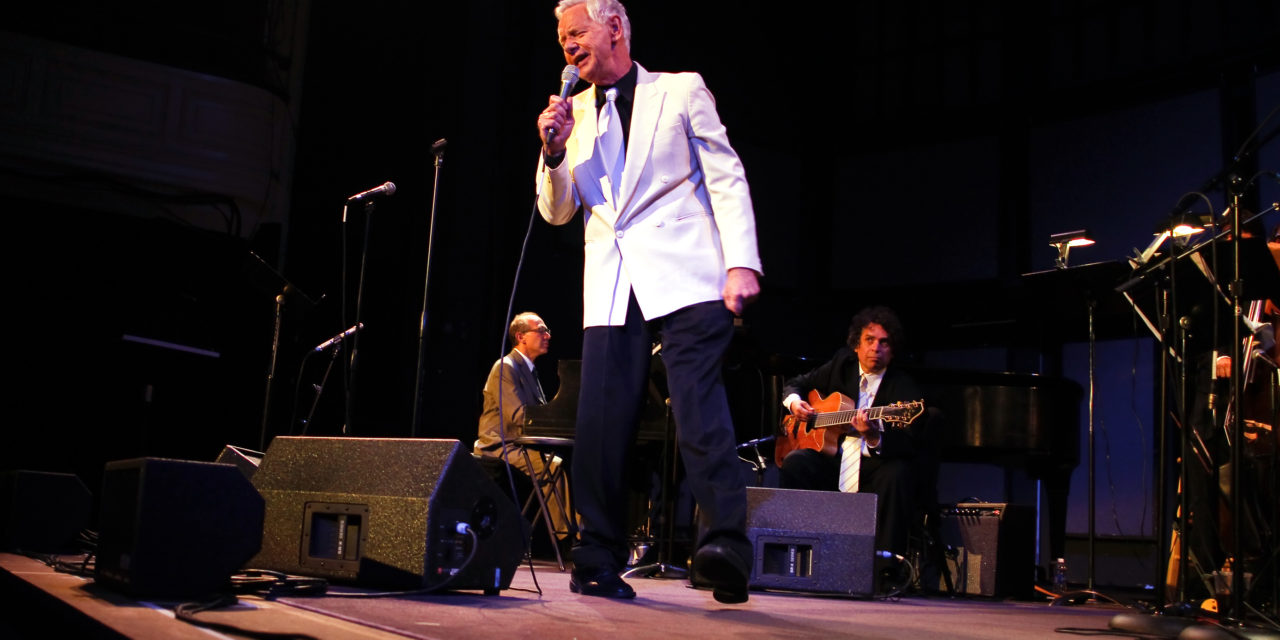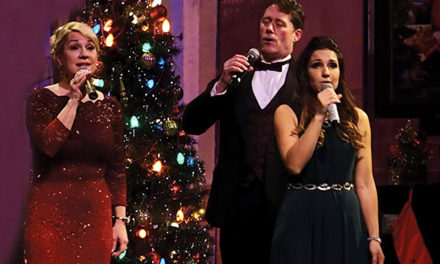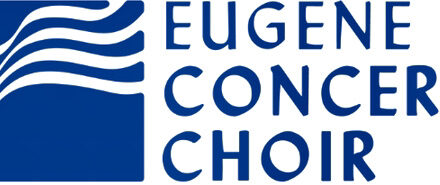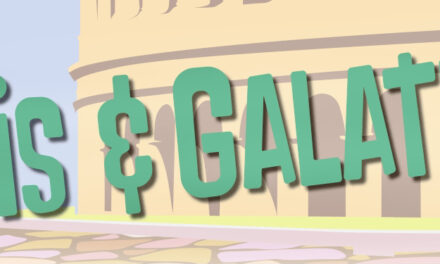(Above: Ian Whitcomb in 2012, his long musical and writing career including frequent perfomances in Eugene, at The Shedd’s Oregon Festival of American Music; photo by Paul Carter)
By Randi Bjornstad
You may not think you know who Ian Whitcomb is, but if you are of a certain age — that is, if you were a pop music fan in the era of the Beatles, Rolling Stones, Kinks, and Beach Boys in the 1960s — you probably really do.
You also probably do if you have attended performances of the annual midsummer Oregon Festival of American Music at The Shedd any time in the past couple of decades or so, because Whitcomb has been a staple there, lecturing on early popular music from the fabled Great American Songbook by day and performing in OFAM concerts by night, often dressed in white and playing accordion or ukelele.
In the earlier incarnation, Whitcomb was the fashionably shaggy-haired pianist and singer who belted out all those breathless and rather suggestive huh-huh-huh-huh-huhs in his 1965 hit, You (Really) Turn Me On, which topped out at No. 8 on the Billboard Hot 100 Chart the week ending July 10, 1965.
No. 1 that week was the Rolling Stones’ (I Can’t Get No) Satisfaction, followed by I Can’t Help Myself, better known as Sugar Pie Honey Bunch by the Four Tops, Herman’s Hermits’ I’m Henry VIII, I Am, and Mr. Tambourine Man by The Byrds.
The other songs that ranked above Whitcomb and his group Bluesville that week were Cara, Mia by Jay & the Americans, Barbara Mason with Yes, I’m Ready, and Seventh Son by Johnny Rivers.
Following Whitcomb in the 9th and 10th spots there was What The World Needs Now Is Love by Jackie DeShannon and Tom Jones’ What’s New Pussycat?.
Not too shabby. And what a great birthday gift — because Ian Whitcomb turned 24 the same week, in fact on July 10.
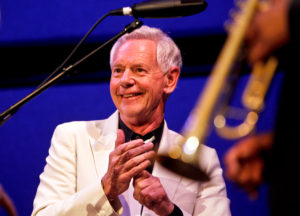
Ian Whitcomb (1941-2020); photo by Paul Carter
James Ralph, executive director at The Shedd, knew Whitcomb in a much different milieu, of course. The two, both savants of early 20th-century popular music and theater, had become fast friends after being introduced by Dick Hyman, another fixture of The Shedd’s annual OFAM.
To Ralph’s sorrow, Whitcomb died in Los Angeles, where he had lived for decades, on April 19. He was 78.
“I just loved the man,” Ralph said in a telephone interview several days later. “He had so many great stories, and he knew everybody.”
The two met through jazz pianist Dick Hyman, who has been involved with OFAM and The Shedd since the early 1990s.
“Dick Hyman and I were putting together a show at The Shedd that included The Rite of Spring (by Igor Stravinsky), and we were trying to figure out what to pair that with,” Ralph recalled. “Dick said, ‘I know, music from the sinking of the Titanic’ — he said he had a friend in L.A. who had done a recording recreating the music that was played by the orchestra during the sinking of the Titanic.”
With Hyman’s encouragement, Whitcomb paid Eugene a visit, and the relationship — both professional and personal — was cemented.
Whitcomb was a musicologist with prolific writings to his credit, Ralph said.
“What he did so well for me and OFAM was that no matter what we were doing, he could always find something he had written about it at one time or another, no matter how obsure it was — I remember once he even came up with this piece he’d researched about Woody Guthrie before he reinvented himself as a folk singer.”
Whitcomb knew just about everyone in the music world, Ralph said.
“One night my phone rang, and I answered it, and it was Ian, saying, ‘Jim, Jim, Jim — I’m here in my kitchen with Brian Wilson (of the Beach Boys), and telling him how great OFAM is, and you’ve got to get him to be in it.’ “
It actually nearly happened, Ralph said. Wilson was on board to participate, “and then at the last minute something came up in Rio de Janeiro that he really had to do instead,” he said. “But that’s the kind of person Ian was, the kind of relationships he had with people.”
Whitcomb quickly became a favorite among the OFAM regulars, “almost like a mascot,” Ralph said. “He was such a sweet man, somewhat fragile in a way — a little nervous — but he really knew his stuff and really loved to share it.”
Even after Whitcomb suffered a severe stroke in 2012, he continued to travel to Eugene to participate in OFAM.
“It was tough after that — I helped him prepare the lectures he did during the day, and he still sang in performances, although he couldn’t play the accordion or the ukulele any more,” Ralph said.
Ralph last talked to Whitcomb about three weeks before his death. “He’d had some serious health issues, but he seemed in pretty good spirits,” he said.
Ian Timothy Whitman was born July 10, 1941, in England. An obituary in Variety described his career as “multi-faceted … included on the soundtracks of several films, including Peter Bogdanovich’s romantic drama, The Cat’s Meow, and he also appeared as an actor in several films and television shows.”
In addition, Variety continued, Whitcomb produced Mae West’s album, Great Balls of Fire, and had several books on popular music to his credit, as well as hosting a radio show about American and British popular music.
He was a frequent guest on the Tonight Show Starring Johnny Carson.
A couple of years ago, Ralph created “Ian’s Top 10,” a series of 10 songs chosen from a year appropriate to the OFAM theme.
“We would put together a show, and he would do a lecture, do the songs and talk about them. It was a little difficult for him by that point, but everybody loved him, and pulled for him, and helped him.
“That was the kind of guy he was.”
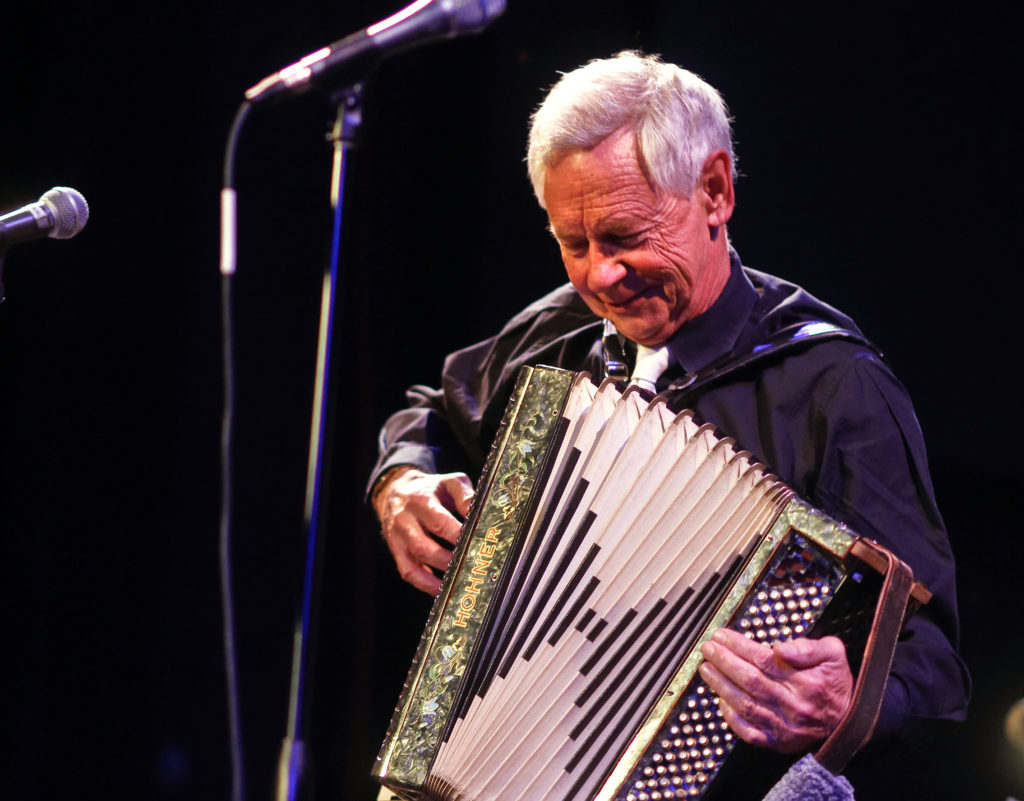
In addition to singing, composing, and writing, Ian Whitcomb was an accomplished musician, playing piano, accordion, and ukulele, until he suffered a debilitating stroke in 2012; photo by Paul Carter

